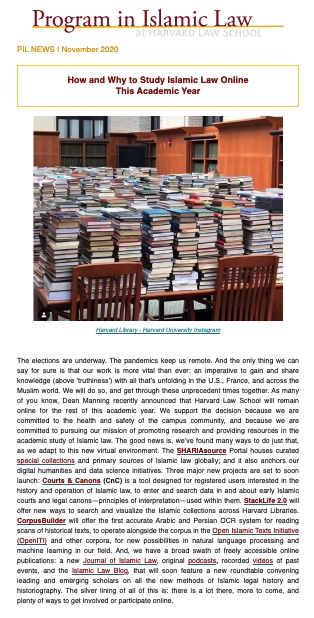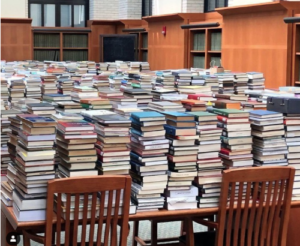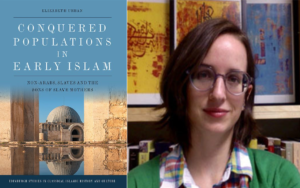
 How and Why to Study Islamic Law Online This Academic Year The elections are underway. The pandemics keep us remote. And the only thing we can say for sure is that our work is more vital than ever: an imperative to gain and share knowledge (above ‘truthiness’) with all that’s unfolding in the U.S., France, and across the Muslim world. We will do so, and get through these unprecedent times together. As many of you know, Dean Manning recently announced that Harvard Law School will remain online for the rest of this academic year. We support the decision because we are committed to the health and safety of the campus community, and because we are committed to pursuing our mission of promoting research and providing resources in the academic study of Islamic law. The good news is, we’ve found many ways to do just that, as we adapt to this new virtual environment.
How and Why to Study Islamic Law Online This Academic Year The elections are underway. The pandemics keep us remote. And the only thing we can say for sure is that our work is more vital than ever: an imperative to gain and share knowledge (above ‘truthiness’) with all that’s unfolding in the U.S., France, and across the Muslim world. We will do so, and get through these unprecedent times together. As many of you know, Dean Manning recently announced that Harvard Law School will remain online for the rest of this academic year. We support the decision because we are committed to the health and safety of the campus community, and because we are committed to pursuing our mission of promoting research and providing resources in the academic study of Islamic law. The good news is, we’ve found many ways to do just that, as we adapt to this new virtual environment.
The SHARIAsource Portal houses curated special collections and primary sources of Islamic law globally; and it also anchors our digital humanities and data science initiatives. Three major new projects are set to soon launch: Courts & Canons (CnC) is a tool designed for registered users interested in the history and operation of Islamic law, to enter and search data in and about early Islamic courts and legal canons—principles of interpretation—used within them. StackLife 2.0 will offer new ways to search and visualize the Islamic collections across Harvard Libraries. CorpusBuilder will offer the first accurate Arabic and Persian OCR system for reading scans of historical texts, to operate alongside the corpus in the Open Islamic Texts Initiative (OpenITI) and other corpora, for new possibilities in natural language processing and machine learning in our field. And, we have a broad swath of freely accessible online publications: a new Journal of Islamic Law, original podcasts, recorded videos of past events, and the Islamic Law Blog, that will soon feature a new roundtable convening leading and emerging scholars on all the new methods of Islamic legal history and historiography. The silver lining of all of this is: there is a lot there, more to come, and plenty of ways to get involved or participate online.
 CONTENT: HLS Library Guide Harvard Law School Library released an updated Guide to researching Islamic Law by Librarian for Islamic Law, Gayle Fischer, and Research Librarian for Foreign, Comparative & International Law, Stephen Wiles. This guide details a trove of electronic sources, including encyclopedias on Islam and Islamic law; field-specific dictionaries in English, Arabic, Persian, and Turkish; full-text sites for searching the Qur’an and its commentaries in Arabic and in translation; hadith collections with side-by-side translation; bibliographies on Islamic law; introductory works in English and Arabic; digitized Islamic manuscripts; indexed journals and databases for full text publications and bibliographic citations; international law guides, national gazettes, and chronicles; and, fatwas.
CONTENT: HLS Library Guide Harvard Law School Library released an updated Guide to researching Islamic Law by Librarian for Islamic Law, Gayle Fischer, and Research Librarian for Foreign, Comparative & International Law, Stephen Wiles. This guide details a trove of electronic sources, including encyclopedias on Islam and Islamic law; field-specific dictionaries in English, Arabic, Persian, and Turkish; full-text sites for searching the Qur’an and its commentaries in Arabic and in translation; hadith collections with side-by-side translation; bibliographies on Islamic law; introductory works in English and Arabic; digitized Islamic manuscripts; indexed journals and databases for full text publications and bibliographic citations; international law guides, national gazettes, and chronicles; and, fatwas.
 CONTEXT: PIL Book Talk Webinar In our Islamic Law Speaker Series, Professor Elizabeth Urban of West Chester University discussed her new book on Conquered Populations in Early Islam bringing the liminality of three groups in focus characterized by “unfreedom”: conquered non-Arab Muslim converts, enslaved women, and the children of mixed unions between enslaved and free peoples. She explores the integration of new Muslims of slave origins and the categories of unfreedom and ethnicity: who are the outsiders, how does one become an insider, and what do boundaries of conversion assimilation look like? Professor Matthew Gordon of Miami University served as a discussant, examining the changing historical contexts of institutional stratification. See the full webinar on the PIL website and Vimeo.
CONTEXT: PIL Book Talk Webinar In our Islamic Law Speaker Series, Professor Elizabeth Urban of West Chester University discussed her new book on Conquered Populations in Early Islam bringing the liminality of three groups in focus characterized by “unfreedom”: conquered non-Arab Muslim converts, enslaved women, and the children of mixed unions between enslaved and free peoples. She explores the integration of new Muslims of slave origins and the categories of unfreedom and ethnicity: who are the outsiders, how does one become an insider, and what do boundaries of conversion assimilation look like? Professor Matthew Gordon of Miami University served as a discussant, examining the changing historical contexts of institutional stratification. See the full webinar on the PIL website and Vimeo.
See the full newsletter.

